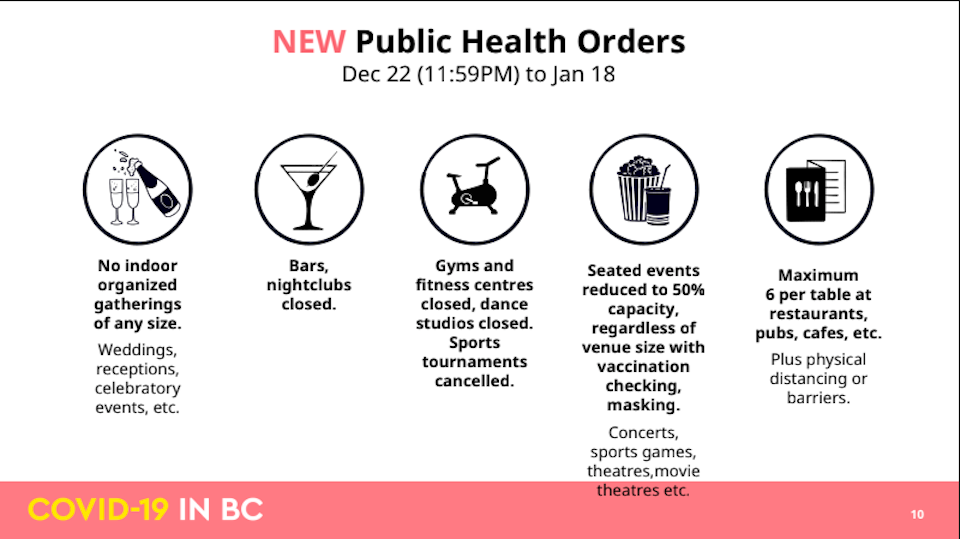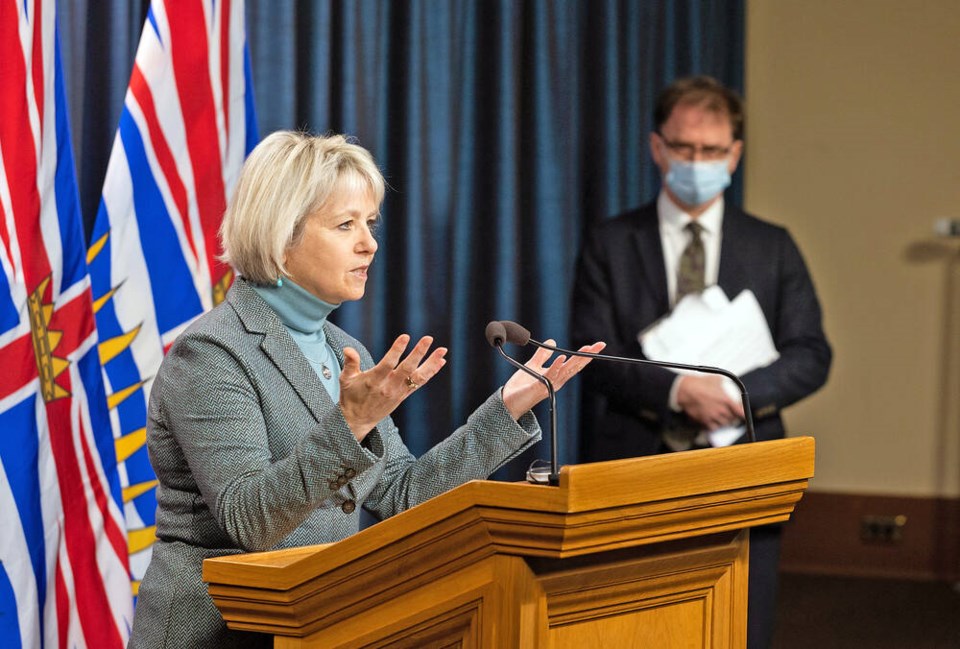New provincial health orders will come into effect Wednesday at 11:59 p.m. to try to slow the rapid spread of the Omicron variant of the COVID-19 virus and prevent B.C.’s health-care system from being overwhelmed.
Bars, nightclubs, gyms, fitness centres and dance studios will be closed until Jan. 18. All organized indoor gatherings, such as weddings and Christmas parties, must be cancelled. Sports tournaments will also be cancelled.
Restaurants, pubs and cafés are still able to operate with a maximum of six people per table and space between the tables.
Concert, theatre, movie and sports venues will be limited to 50 per cent capacity, regardless of size, with masking and vaccination-checking.
Personal gatherings are limited to individual households plus one other household or 10 guests, all vaccinated.
Non-urgent surgeries will be postponed starting Jan. 4 to manage pressure on acute-care facilities. Urgent and emergency surgeries will continue.
The Omicron variant is rapidly replacing the Delta variant of the COVID-19 virus in the province, with a sharp increase in cases. Health officials still don’t know the severity of illness resulting from Omicron, and what the impact will be on the health-care system.
Provincial health officer Dr. Bonnie Henry said Tuesday that Omicron is definitely more transmissible than the Delta variant and more easily infects those who are vaccinated or have had COVID-19.
“It is inevitable now that most of us in the province will be exposed at some point. The way this strain of the virus is being transmitted through communities across the province, it is very likely that all of us will have exposure to it over time.”
The goal of the new measures is to buy time to understand the variant and prepare for it, said Henry. “The consequences of not slowing thing down, of not taking these actions, are just too dire. We need to protect our health-care system for everybody who needs care.”
Both Henry and Health Minister Adrian Dix encouraged people to keep groups as small as possible over the holidays to reduce the risk of exposure, adding it’s best to stick to the same group of people.

The province’s testing resources are being stretched by people who want to get a test before socializing with family and friends at Christmas, said Henry. “If you do not have symptoms, do not go to the testing centre.”
The province is ramping up its rapid-testing program. B.C. received more than three million rapid tests as of Dec. 15 and has distributed 1.2 million in five key areas — long-term care, corrections, rural and Indigenous communities, case and contact management, and staff screening programs.
B.C. is expecting to receive 200,000 PANBIO rapid nasal swab kits from the federal government by Dec. 31 and has also purchased 500,000 BTNX rapid tests with nasal swabs. The province is also expecting to receive 10 million at-home tests from the federal government in mid- to late January.
The province will make rapid testing available at some collection sites for people with symptoms. Tests will be provided at additional locations in the community. Kits will be provided for students and staff in K-12 schools and for students, faculty and staff in post-secondary education.
Booster-shot programs will also be expanded starting in January when large venues, such at the Vancouver Convention Centre, will become mass immunization sites. Island Health is still securing a mass-vaccination clinic site in Victoria.
Boosters for everyone 18 and older were announced on Oct. 26. So far, 727,761 people have received third doses, including 67 per cent of people 70 and over. The age-based rollout is expected to continue at an accelerated pace.





